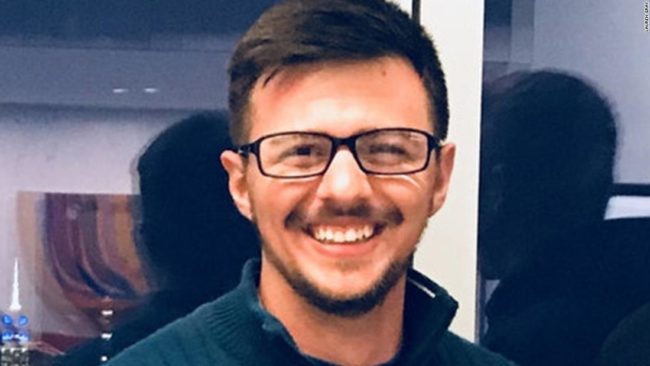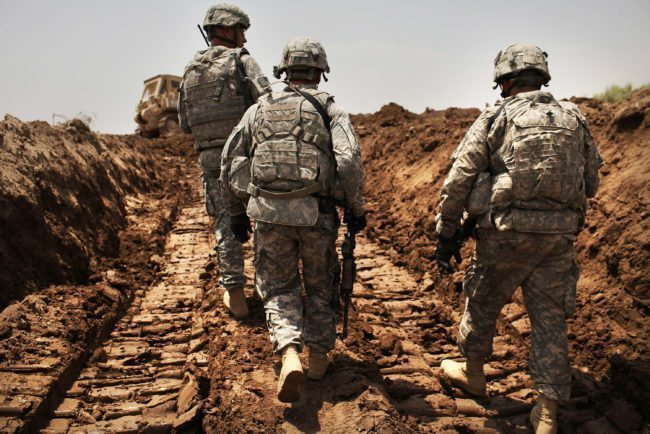This trans guy will apply to join the US military next week, in key challenge to Trump ban

Donald Trump’s ban on transgender people in the US military could be about to be broken – as a key showdown approaches.
Donald Trump announced on Twitter earlier this year that all transgender servicepeople would be purged from the US armed forces, claiming they were a burden on the military.
The policy led to a spate of legal action – and may be derailed entirely after court rulings against Trump.
Four different courts have issued rulings blocking the Trump administration from stalling the implementation of Obama-era guidelines on transgender troops – which means the pre-existing policy, allowing transgender people to join the military, will come into force from January 1.
And at least one transgender person will be there to challenge the ban on day one.
Nicolas Talbott, a transgender man who has long dreamed of joining the military, says he will begin his application to join the military next Tuesday.

Mr Talbott, who has already been in touch with a military recruiter, will schedule an appointment with the Military Entrance Processing Station, and has been preparing to undergo the required tests and physical evaluations.
But he is hoping that, if the Trump administration is not successful in its attempts to block him, he will become the first person to flout the ‘ban’.
He told CNN: “This whole process with the courts has been a roller coaster.
“We are doing well, but we are not out of the woods yet. I’m trying to stay wary, and I’m definitely nervous that we might hit another setback.”
The 24-year-old Ohio man hopes to join the Air Force National Guard, and has spent a year preparing for the entrance exam.
Speaking to BuzzFeed, he added: “My Air Force recruiter is just sitting and waiting. He knows I’m ready.
“We’re just waiting on policy at this point — for the official paperwork to hit his desk.
“There really is nothing about allowing transgender people to enlist that is going to be a detrimental to the military at all.”

(Photo by Spencer Platt/Getty Images)
Mr Talbott is getting support from LGBT rights organisation NCLR (National Center for Lesbian Rights).
NCLR legal director Shannon Minter said: “The clock is ticking, and every second we get closer to January 1, individuals like Nicolas whose lifelong dream is to serve our country are getting closer to realizing that dream.”
She added: “Trump’s ban is a dangerous policy, which has wreaked havoc in the lives of transgender service members and the entire transgender community. Each court that rules against it brings us closer to a permanent end to this nightmare.”
The Pentagon has already put procedures in place for trans troops to enlist after the January 1 deadline.

(Isaac Brekken/Getty Images)
Jennifer Levi, Director of GLAD’s Transgender Rights Project, said: “Four district courts have now ordered the military to allow transgender people to enlist and serve.
“The military has put in place procedures to ensure the orderly processing of enlistment applications as of January 1.
“And transgender people continue to serve proudly and courageously across the globe. The case against President Trump’s ban on military service by transgender people is gaining momentum.
“There is no principled reason to prevent qualified transgender people, who wish to do so, from putting their lives on the line to defend our country.”
The Trump administration has recently sought an emergency injunction to allow it to continue banning transgender personnel beyond the January 1 deadline.
The administration has been seeking an emergency stay to block the deadline, claiming that accepting transgender people would involve a massive bureaucratic burden and that 23,000 staff would need in-depth training on transgender issues.
It claimed: “There are considerable requirements associated with implementing this significant and complex policy change.
“Those personnel directly responsible for execution number in the tens of thousands and are geographically dispersed across the United States.
“Specifically, implementation of a new accession policy necessitates preparation, training, and communication to ensure those responsible for application of the accession standards are thoroughly versed in the policy and its implementation procedures.”

(Getty)
The administration claimed that 20,367 recruiters and 2,785 employees would need training to “have a working knowledge or in-depth medical understanding of the standards and identity validation requirements associated with processing an applicant under new requirements”.
However, the claim has been rubbished in a document published by three former military chiefs.
The three former surgeons general, Vice Admiral Donald C. Arthur, Major General Gale Pollock, and Rear Admiral Alan M. Steinman, found that contrary to the claims, the training process “is not complicated or time-consuming”.
They wrote: “Trump administration officials have claimed that in order to begin processing transgender applicants for military service
“According to the administration, training will be difficult and complex, because “no other accession standard has been implemented that presents such a multifaceted review of an applicant’s medical history” and because the military will have to “ensure that the ‘tens of thousands’ of service members ‘dispersed across the United States’ responsible for implementing accession policies ‘have a working knowledge or in-depth medical understanding of the standards.’
“[But] of the 23,000 personnel who DOD claims must be trained to process transgender applicants, 20,367 (89 percent) are recruiters.
“Recruiters do not need additional training to process applications from transgender candidates. All service members who
are now recruiters have received training along with the rest of the force in inclusive retention policy for transgender personnel, so they understand the basic outlines of policy and the basic facts of gender identity.”
They added: “Recruiters do not need to understand transgender medicine or transgender accession standards any more than they need to understand cardiology or cardiology accession standards.
“Recruiters help candidates fill out medical disclosure forms and determine whether medical records are needed and what documentation may be necessary. But they do not diagnose gender dysphoria.”
Recruiters’ only relevant responsibility is to help applicants prepare a required package of medical information, a simple and straightforward task.
“According to one of the nation’s top experts in accession policies and practices, sending a one-page instruction to all recruiting stations would suffice if it has not already been done.”

